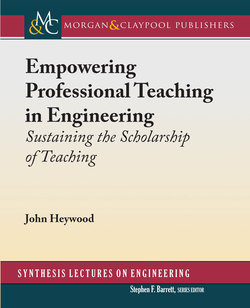Читать книгу Empowering Professional Teaching in Engineering - John Heywood - Страница 7
На сайте Литреса книга снята с продажи.
ОглавлениеContents
Foreword
Preface and Introduction
Acknowledgments
1 Accountable to Whom? Learning from Beginning Schoolteachers 1
1.1 Introduction
1.2 Accountability in Higher and Engineering Education
1.3 Accountability and Evaluation in Schools
1.4 Accountability and Professionalism
Notes and References
2 “Oh that we the gift of God to see ourselves as others see us,” Learning from Beginning Teachers 2
2.1 Introduction
2.2 Recording One’s Class
2.3 Perceptual Learning in the Classroom
2.4 Elliot Eisner’s Concept of Educational Connoisseurship
Notes and References
2.5 Appendix
3 Toward a Scholarship of Teaching. Teaching as Research
3.1 Introduction
3.2 The Scholarship of Teaching
3.3 Teaching and Design
3.4 Teaching as Research–An Approach to Scholarship
Notes and References
3.5 Appendix
4 Objectives and Outcomes
4.1 The Social Efficiency Ideology
4.2 The Objectives Movement
4.3 The Taxonomy of Educational Objectives
4.4 Eisner’s Objections to the Objectives Approach
4.5 Instructional Planning
4.6 Questioning, Questions, and Classroom Management
4.7 Reconciliation: A Conclusion
Notes and References
5 Problem Solving, Its Teaching, and the Curriculum Process
5.1 Introduction
5.2 Definitions and Approaches to Teaching Problem Solving
5.3 Types of Problem, Difficulty, and Complexity
5.4 Assessment, Instruction, and Objectives–The Curriculum Process
5.5 Difficulty in, and Time for Learning
Notes and References
6 Critical Thinking, Decision Making, and Problem Solving
6.1 Introduction
6.2 Teaching a Decision Making Heuristic
6.3 Qualitative Strategies
6.4 Critical Thinking
6.5 A category for Problem Solving?
6.6 Looking Back Over Journeys 4, 5, and 6
Notes and References
7 The Scholar Academic Ideology of the Disciplines
7.1 Introduction
7.2 The Received Curriculum or the Scholar Academic Ideology
7.3 The Post Sputnik Reform Projects
7.4 Discovery (inquiry) Based Learning
7.5 Is Engineering a Discipline?
Notes and References
8 Intellectual Development
8.1 The Spiral Curriculum
8.2 Engineering and the School Curriculum
8.3 Curriculum Questions Raised by Piaget’s Theory of Cognitive Development
8.4 Intellectual Development: Perry and King and Kitchener
Notes and References
9 Organization for Learning
9.1 Introduction
9.2 The “Advanced Organizer”
9.3 Using “Advanced Organizers”
9.4 Prior Knowledge; Memory
9.5 Cognitive Organization
9.6 Mediating Responses
9.7 Impact of K-12 and Career Pathways
Notes and References
10 Concept Learning
10.1 Robert Gagné
10.2 Misperceptions
10.3 Using Examples
Notes and References
11 Complex Concepts
11.1 Complex and Fuzzy Concepts
11.2 Staged Development
11.3 Concept Mapping and Key Concepts
Notes and References
12 The Learning Centered Ideology–How Much Should We Know About Our Students?
12.1 Introduction
12.2 Communities of Practice, Communities that Care
12.3 Learning Styles
12.4 Convergent and Divergent Thinking
12.5 Kolb’s Theory of Experiential Learning
12.6 Felder-Solomon Index of Learning Styles
12.7 Temperament and Learning Styles
Notes and References
13 Intelligence
13.1 IQ and its Impact
13.2 Psychometric Testing
13.3 Controversies
Notes and References
14 Two Views of Competency
14.1 Nature vs. Nurture: Nature and Nurture
14.2 Inside and Outside Competencies
Notes and References
15 From IQ to Emotional IQ
15.1 Introduction
15.2 Implicit Theories of Intelligence, Formal, and Unintended but Supportive
15.3 Emotional Intelligence
15.4 Practical Intelligence
Notes and References
16 Social Reconstruction
16.1 The Fourth Ideology
16.2 Constructive Controversy
16.3 Debates
16.4 Mock Trials
16.5 Turning the World Upside Down
16.6 A case Study for Conclusion
Notes and References
Author’s Biography
Author Index
Subject Index
